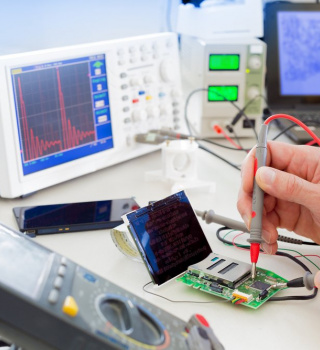
Description
An electronics engineer works with high-level technology in a range of sectors. They design, develop and test components, devices, systems or equipment that use electricity as part of their source of power. These components include capacitors, diodes, resistors and transistors.
They can be involved at any stage of a project including the initial brief for a concept, the design and development stage, testing of prototypes and the final manufacture and implementation of a new product or system. Electronic engineers usually work in project teams with colleagues in several other branches of engineering.
Electronic engineers are involved in a variety of areas, as electronics are used in many fields. These areas include:
- defence
- radio and satellite communication
- medical instruments
- mobile phones
- acoustics
- nanotechnology
- robotics.
Electronic engineers usually specialise in a particular subfield of electronic engineering, such as:
- control engineering
- instrumentation
- signal processing
- telecommunications engineering.
Common Duties/Routines
Electronic engineers are mainly responsible for the following:
- Systematically improving the detailed design of a piece of electronic equipment
- Working with colleagues to design new systems, circuits and devices or develop existing technology
- Testing theoretical design
- Writing specifications and technical reports
- Discussing proposals with clients
- Following defined development processes
- Carrying project planning and preparing budgets
- Ensuring that a product will work with devices developed by others, can be made again reliably, and will perform consistently in specified operating environments
- Creating user-friendly interfaces
- Ensuring that the required safety regulations are met
- Supervising technicians, craftspeople and other colleagues.
Their tasks usually depend on the level they're working at. For example, incorporated engineers are responsible for certain aspects of a project and day-to-day operations, while chartered engineers have a strategic role, and are supposed to take over entire projects and developing solutions.
Working hours can often vary, but 40-hours per week can be expected. The commercial pressures related with electronic design mean that extra hours during evenings and weekends may be required at busy times in order to meet deadlines. Contract staff are often recruited to meet peaks in workloads.
If you have a good track record and relevant experience it is possible to find self-employment and freelance work. Short-term contract work is also available, and is often arranged through agencies.
Electronic engineers are typically based in a laboratory or office, although some projects may require them to work in factories, workshops, or even outdoors. As with all areas of engineering, women are quite under-represented. However, several initiatives such as the Women's Engineering Society (WES) and WISE have been put into action to help redress the balance and encourage more women into the industry.
Areas with a strong manufacturing or research base usually have wider opportunities. Frequent traveling within a working day is very common. Overnight absence from home and overseas travel is often required, depending on the employer and nature of the business. There are increasing opportunities to work abroad. Chartered engineers can apply for European engineer status (EUR ING), in order to gain professional recognition in other European countries.

Required/Trained Skills
Most electronics engineers have a degree in electrical or electronic engineering. Other relevant fields that are eligible for entry into the profession include:
- aeronautical engineering
- communications engineering
- computer/software/computer science engineering
- mathematics
- mechanical engineering
- physics and applied physics
- production and manufacturing engineering.
If you have an HND, a relevant NVQ Level 3 qualification or have completed an apprenticeship, you are likely to be considered for an engineering technician post. However, this means working at a lower level and you'll be required to complete further training to reach the electronics engineer role.
A postgraduate qualification isn't necessary it may be useful if your first degree isn't in electrical or electronic engineering. It's useful if your first degree or Masters is accredited by a relevant professional body, such as the Institution of Engineering and Technology (IET) as it will help you achieve the status of incorporated or chartered engineer in the future.
Here are a few set of skills you will need to have:
- a high level of technical knowledge and good IT skills
- Keen analysis and practical problem-solving abilities to improve designs
- Excellent oral, written and diagrammatic communication skills, with the ability to translate complicated ideas into clear and concise concepts
- creativity, innovation and attention to detail
- strategic thinking and commercial awareness of the industry you're in
- organisation, project management and leadership skills
- Ability to work in a multidisciplinary team with other engineers
- an understanding of electrical health and safety legislation.
Pre-entry experience isn't essential, but it is recommended to carry out a relevant placement or industry-based project. Some of the experience gained during a sandwich placement is considered towards qualifying for CEng status. It can also help to make contacts with future employers.
You can also avail the IET Power Academy scholarship at certain universities. This provides a bursary, mentoring, paid placements and money towards study aids. Vacation work, placements and sandwich courses all provide crucial evidence of skills development and commercial awareness, which are increasingly important in this sector.
Work Environment
You can find employment in a range of industries, including:
- the electrical and electronics industry, including robotics, digital technology, automotive, telecommunications, electronics consultancies and electronic equipment manufacturers
- other engineering industries, such as aerospace, energy, chemical and marine
- non-electrical organisations, for example, helping to implement and maintain computer systems, telecommunications and other technical equipment
- utility companies
- research establishments, both academic and commercial
- the public sector, including the Civil Service, local authorities, hospitals and educational institutions
- government departments like the Ministry of Defence (MoD) within specialist areas such as the Defence Engineering and Science Group (DESG) Graduate Scheme.
Salary/Compensation
Salaries vary from company to company, with some sectors providing higher salaries due to increasing demand. Income figures are intended as a guide only. Starting salaries for electronics engineers are around £21,000 to £25,000. With experience and working at an incorporated engineer level, you could earn up to £28,000 to £40,000. As a senior engineer you can expect a salary of between £40,000 and £65,000, with chartered engineers earning at the top of this scale.
Skillset 4
Skillset
HARD SKILLS
- Electronics Engineering skills
- Machinery skills
- Math skills
- Physics knowledge
